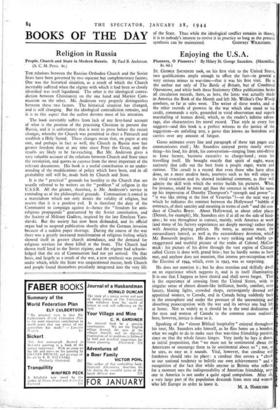Enjoying the U.S.A.
ST. GEORGE SAUNDERS took, on his first visit to the United States, two qualifications ample enough to offset the fact—in general a very serious minus in war-time—that it was his first visit. He is the author not only of The Battle of Britain, but of Combined Operations, and while both these Stationery Office publications broke all circulation records, there, as here, the laer was actually made in America the Book of tt the Month and left Mr. Willkie's One World nowhere, so far as sales went. The writer of these works, and of the other records of prowess in the war which also stand to his credit, commands a style, grounded in vivid observation and superb marshalling of human detail, which, to the reader's infinite advan- tage, also characterises his travel record. That style in every line suggests—and this book is a perfect witness to the justice of the suggestion—an unfailing zest, a gusto that knows no boredom and carries over any amount of fatigue.
Gusto animates every line and paragraph of* these 192 pages and communicates itself ; Mr. Saunders enjoyed pretty nearly every- thing—his food, his drink, his conversation—ranging from taxi-driver to Iowa farmer, business executivz to charge-hand ; even his travelling itself. He brought exactly that spirit of eager, warm curiosity that calls out the best from a people eager, warm and curious. The .result is a record that even those who have often done, on a more modest basis, journeys such as his will enjoy in its vivid evocation and its shrewd incidental comment, as they will admire the skill with which the writer builds his pictures. What, for instance, could be more apt than the sentence in which he sums up his impression of Dorothy. Thompson's " strength and power "- " it was like sitting at the foot of Vesuvius "?—or the neat way in which he indicates the contrast between the Hollywood "babble of contracts, of their sanctity and meaning in terms of cash " and the con- duct of Charles Boyer. About Hollywood, as about other places (Detroit, for example), Mr. Saunders errs if at all on the side of kind- ness ; he was throughout in contact, mainly, with America at work (and many of his factory experiences are deeply moving) rather than with America playing politics. He notes, as anyone must, the extraordinary hatred, as well as the extraordinary devotion, whiclf Mr. Roosevelt inspires. He draws a very striking and wholly un- exaggerated and truthful picture of the realm of Colonel McCor- mick : his picture of his drive through the vast region of Chicago called Cicero is done with grand brio ' • but he hardly seems to have met, and anyhow does not mention, that intense pre-occupation with the Election of 1944, which, even in 1943, was so surprising.
He does not mention it ; but he does mention and skilfully dwell on an experience which suggests it, and is in itself illuminating. It is one that I happen to have shared and shall never forget. That is the experience of crossing from the United States, with its singular sense of almost dream-like brilliance, bustle, comfort, even luxury, blazing lights, crowded shops, extravagantly dressed and appointed women, to Canada, and in Canada being suddenly back in the atmosphere and under the pressure of the unremitting and absorbing preoccupation with the war and its service one had left at home. Not as widely as it should be is the total dedication of the men and women of Canada to the common cause realised ; here, however, justice is done to it.
Speaking of the "almost Biblical hospitality" enjoyed throughout his tour, Mr. Saunders asks himself, as he flies home on a bomber, what we ought to do to make sure that war-time friendship persists, since on that the whole future hinges. Very justly he lays it down, as initial proposition, that " we must not be sentimental about the Americans or encourage them to be sentimental about us" • not, as he says, as easy as it sounds. Vital, however, that candour and frankness should take its place: a candour that covers a " check to our national tendency to belittle our own achievements " and 3 recognition of the fact that while anyone in Britain who reflects for a moment sees the indispensability of American friendship, any- one in America is not under a quite equal conipulsion. After all, a very large part of the population descends from men and women
Who left Europe in order to leave it • M. A. HAMILTON


























 Previous page
Previous page